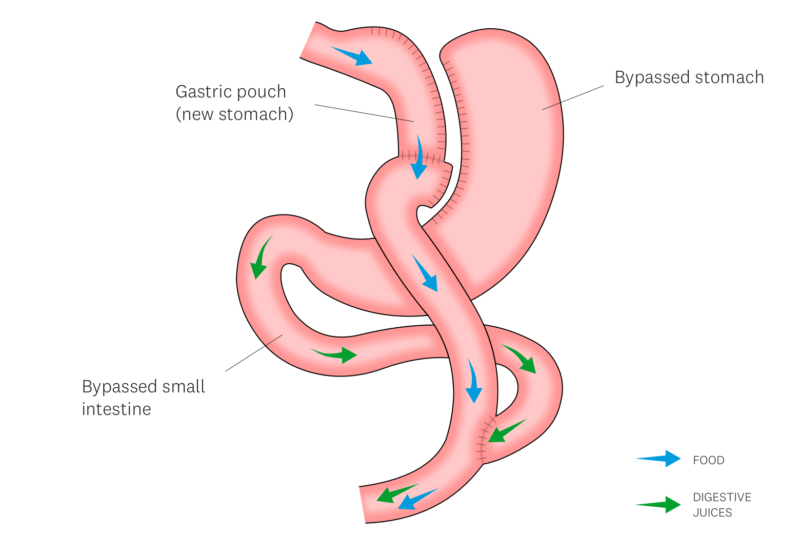The roux en y gastric bypass has evolved over the last 50 years.
Creating the gastric bypass involves joining small bowel to a small stomach created from the original stomach. Food and fluid mixes with digestive juices from the bypassed stomach and small bowel via a second join further down.

This results in restriction of oral intake, some malabsorption of nutrients, and alterations to gut hormone action on the bowel.
Weight loss is achieved through the combination of the above actions.
On average, you will lose 70% of your excess weight.
Some of the specific complications of laparoscopic roux en y gastric bypass include:
- Anastomotic leak (1-2%) – stomach fluid may leak out into the abdomen at either of the two joins created during this procedure, due to failure of the joins to heal. This may require further surgery/procedures and a prolonged hospital stay.
- Marginal ulceration – this is an erosion/ulcer of the small bowel joined to the gastric pouch, similar to a stomach ulcer. This may cause pain in the upper abdomen or chest. Most times this can be treated with medications. Occasionally, this requires revisional surgery.
- Stomal Stenosis – a narrowing at the join between stomach and small bowel. You may develop vomiting and rapid weight loss due to inability of food and/or fluids to pass through the narrowed area. This may require stretching up with a balloon, or placement of a stent (tube) and removal 4 weeks later. Occasionally, this requires revisional surgery.
- Stomal dilation – a widening at the join between stomach and small bowel. You may be able to eat more. This may be fixed by narrowing the opening with stitches endoscopically (via a scope placed through the mouth). Occasionally, this may require revisional surgery.
- Internal Hernia (2%) – bowel may get trapped in spaces created during the formation of the gastric bypass, even though these spaces are routinely closed. This may cause a blockage of the small bowel (obstruction) or lead to a lack of blood supply to the small bowel (strangulation). This is an emergency. You must go to your local hospital immediately if you have significant abdominal pain lasting more than one hour, with or without vomiting.
- Dumping syndrome – a cluster of symptoms including Nausea/vomiting, rapid heartbeat, sweating, flushing, light-headedness, abdominal cramps, and diarrhoea. This is usually due to eating too much or eating foods high in sugar. This can be fixed by modifying your eating habits.
- Nutritional deficiencies – even though you will need to take multivitamin supplements, you may become low in certain vitamins or minerals. You may need additional supplementation. You will require lifelong follow-up and blood tests to monitor for potential deficiencies.